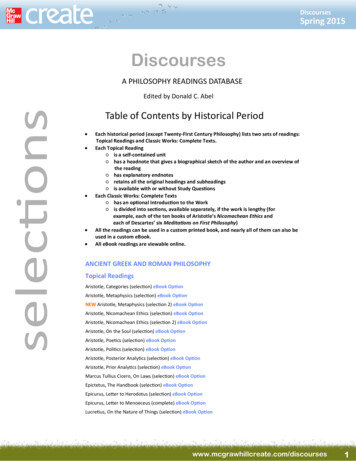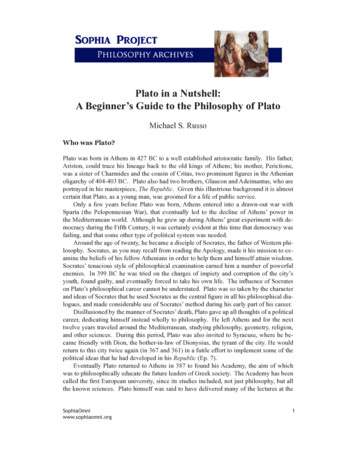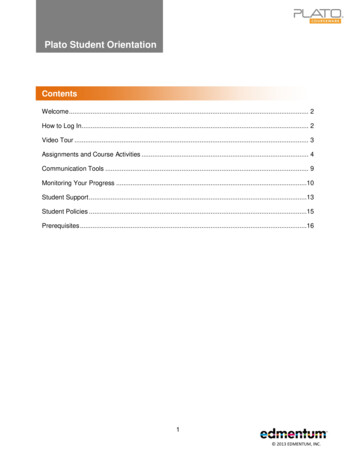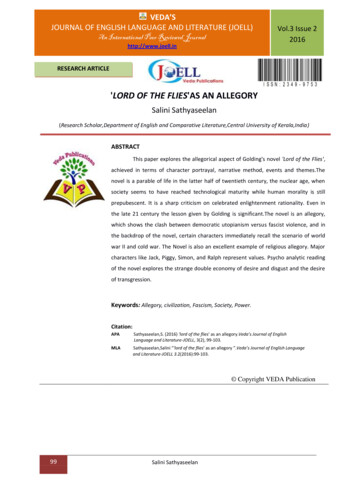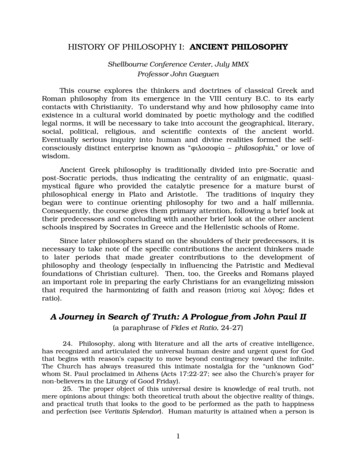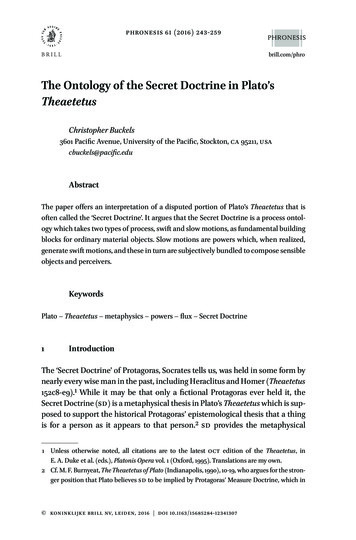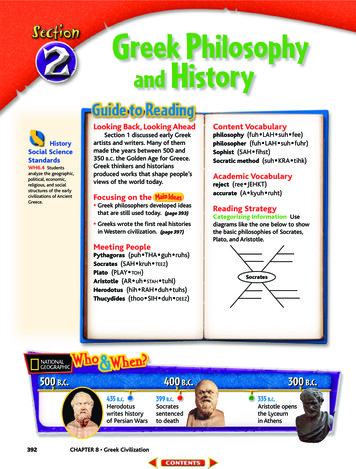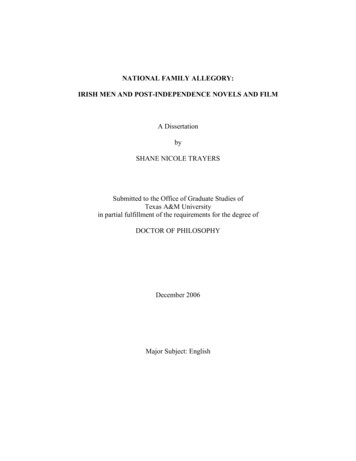
Transcription
Austin Community CollegeAustin, Texas, USAIntroduction to PhilosophyProfessor Arthur Dechene, PhDPlato, The Allegory of the CaveAlso called The Myth of the Cave or The Parable of the Cave.From Book VII of The Republic (360 B.C.E.) Translated by Oxford professor Benjamin Jowett (1817-93).1Socrates is speaking with Plato’s older brother, Glaucon:2345678And now, I said, let me show in a figure how far our nature is enlightened or unenlightened: Behold!human beings living in an underground cave, which has a mouth open towards the light and reaching allalong the cave; here they have been from their childhood, and have their legs and necks chained so thatthey cannot move, and can only see before them, being prevented by the chains from turning roundtheir heads. Above and behind them a fire is blazing at a distance, and between the fire and the prisoners there is a raised way; and you will see, if you look, a low wall built along the way, like the screenwhich marionette players have in front of them, over which they show the puppets.9I see.101112And do you see, I said, men passing along the wall carrying all sorts of vessels, and statues and figures ofanimals made of wood and stone and various materials, which appear over the wall? Some of them aretalking, others silent.13You have shown me a strange image, and they are strange prisoners.1415Like ourselves, I replied; and they see only their own shadows, or the shadows of one another, whichthe fire throws on the opposite wall of the cave?1617True, he said; how could they see anything but the shadows if they were never allowed to move theirheads?18And of the objects which are being carried in like manner they would only see the shadows?19Yes, he said.2021And if they were able to converse with one another, would they not suppose that they were namingwhat was actually before them?22Very true.232425And suppose further that the prison had an echo which came from the other side, would they not besure to fancy when one of the passersby spoke that the voice which they heard came from the passingshadow?26No question, he replied.27To them, I said, the truth would be literally nothing but the shadows of the images.Page 1 of 6
28That is certain.293031323334353637And now look again, and see what will naturally follow if the prisoners are released and disabused oftheir error. At first, when any of them is liberated and compelled suddenly to stand up and turn his neckround and walk and look towards the light, he will suffer sharp pains; the glare will distress him, and hewill be unable to see the realities of which in his former state he had seen the shadows; and then conceive someone saying to him, that what he saw before was an illusion, but that now, when he is approaching nearer to being and his eye is turned towards more real existence, he has a clearer vision,what will be his reply? And you may further imagine that his instructor is pointing to the objects as theypass and requiring him to name them, -will he not be perplexed? Will he not fancy that the shadowswhich he formerly saw are truer than the objects which are now shown to him?38Far truer.394041And if he is compelled to look straight at the light, will he not have a pain in his eyes which will make himturn away to take in the objects of vision which he can see, and which he will conceive to be in realityclearer than the things which are now being shown to him?42True, he said.43444546And suppose once more, that he is reluctantly dragged up a steep and rugged ascent, and held fast untilhe's forced into the presence of the sun himself, is he not likely to be pained and irritated? When he approaches the light his eyes will be dazzled, and he will not be able to see anything at all of what are nowcalled realities.47Not all in a moment, he said.48495051He will require time to grow accustomed to the sight of the upper world. And first he will see the shadows best, next the reflections of men and other objects in the water, and then the objects themselves;then he will gaze upon the light of the moon and the stars and the spangled heaven; and he will see thesky and the stars by night better than the sun or the light of the sun by day?52Certainly.5354Last of all he will be able to see the sun, and not mere reflections of him in the water, but he will see himin his own proper place, and not in another; and he will contemplate him as he is.55Certainly.565758He will then proceed to argue that this is he who gives the seasons and the years, and is the guardian ofall that is in the visible world, and in a certain way the cause of all things which he and his fellows havebeen accustomed to behold?59Clearly, he said, he would first see the sun and then reason about him.6061And when he remembered his old habitation, and the wisdom of the cave and his fellow-prisoners, doyou not suppose that he would felicitate himself on the change, and pity them?62Certainly, he would.Page 2 of 6
6364656667And if they were in the habit of conferring honors among themselves on those who were quickest to observe the passing shadows and to remark which of them went before, and which followed after, andwhich were together; and who were therefore best able to draw conclusions as to the future, do youthink that he would care for such honors and glories, or envy the possessors of them? Would he not saywith Homer,686970Better to be the poor servant of a poor master, and to endure anything, rather than think as they do and live aftertheir manner?7172Yes, he said, I think that he would rather suffer anything than entertain these false notions and live inthis miserable manner.7374Imagine once more, I said, such a one coming suddenly out of the sun to be replaced in his old situation;would he not be certain to have his eyes full of darkness?75To be sure, he said.767778798081And if there were a contest, and he had to compete in measuring the shadows with the prisoners whohad never moved out of the cave, while his sight was still weak, and before his eyes had become steady(and the time which would be needed to acquire this new habit of sight might be very considerable)would he not look ridiculous? Men would say of him that up he went and down he came without hiseyes; and that it was better not even to think of ascending; and if any one tried to loose another andlead him up to the light, let them only catch the offender, and they would put him to death.82No question, he said.838485868788899091This entire allegory, I said, you may now append, dear Glaucon, to the previous argument; the prisonhouse is the world of sight, the light of the fire is the sun, and you will not misapprehend me if you interpret the journey upwards to be the ascent of the soul into the intellectual world according to mypoor belief, which, at your desire, I have expressed whether rightly or wrongly God knows. But, whethertrue or false, my opinion is that in the world of knowledge the idea of good appears last of all, and isseen only with an effort; and, when seen, is also inferred to be the universal author of all things beautiful and right, parent of light and of the lord of light in this visible world, and the immediate source ofreason and truth in the intellectual; and that this is the power upon which he who would act rationally,either in public or private life must have his eye fixed.Good and Bad Philosophy in Plato’s Cave StorySome very good points: Living in this world is like living in an underground cave in which you can only see shadows and hear echoes. Theidea of humanity being a dazed mass of confused people comes from Parmenides, and the idea that they live ina dim cave and must strive to get free comes from Empedocles (remember his two principles, love and strife). The prisoners are us (line 14).Page 3 of 6
We prisoners need help from some higher being or power. We can’t do it all alone, we need to accept a higherpower who will force us to get out of the cave. This idea is from Empedocles, and is repeated in the modernAmerican philosophies of the Twelve Steps and of A Course in Miracles. The 180ᵒ Principle: The freed prisoner turns around 180ᵒ before he can start toward the truth (lines 30-31). Toget to the truth you must turn completely around, you must turn your back on the shadows in the cave, turnyour back on what this world calls truth and reality. This separating oneself from mob-mind is probably Plato’sversion of Empedocles’ strife principle, that we must separate ourselves from the herd and from Aphrodite’sherd-consciousness enchantment. We are often reluctant to progress towards the light because it makes us uncomfortable, and we want to returnto the comfortable darkness of herd consciousness. The process of moving toward the light takes time (line 48). First we see the true nature of the illusion (when we first see the fire in the cave, and the parade of images infront of it); later, as we emerge from the cave, we start seeing shadows of reality itself. We are justified in philosophizing only after we have beheld pure truth (line 56). The people in the cave hate the truth and truth-bringers, and will go so far as to murder them because theythreaten to expose the illusion of ordinary life and the conspiracy to maintain it (line 81). This undoubtedly relates to Socrates, Plato’s teacher, who was murdered for embarrassing the social-political elite of Athens by unmasking their ignorance with his elenchus.But a disastrously bad ontology: PLURALISTIC ONTOLOGY. For Plato reality is not formless Being, it is the perfect forms of the innumerable separate things thatmake up the universe. The highest knowables, according to Plato, are the perfect/ideal forms of (separate) things. But, as Parmenides showed a hundred years earlier, it is not possible that Being be brokenup into separate things, whether ideal forms or shadow things or any things in between. Plato is peddling a type of ontological pluralism—a mere figment of his imagination that he seems to have beenproud of—and the objective certainty of logic and direct personal experience (meditation) no longercount for anything. Nondualism in Western philosophy died with Plato. From now on philosophy is déraciné (ripped up fromits roots, rootless)—without foundation in reality.LEVELS OR DEGREES OF BEING. Plato describes greater and lesser levels of Being. Those things that are full of Being he calls ideal forms,and, at the other extreme (in the back of the cave), are the shadows, things that have the least Being. Alltogether there are four levels of Being, each level, descending from the level of the ideal forms, imitating and having less Being than the level that precedes it. But Being can’t have levels or degrees. Being isjust Being. It is formless (or empty, as the Mahayana Buddhists term it). Whatever is has all the Beingthere is. Everything that is has as much Being as God itself. Later in Western history Being would be described as a ladder, and then as a “great chain of being.” Thisidea of ascending degrees of Being, starting with rocks (which have very little Being) and ascending toGod (the fullness of Being), became the dominant ontology in the West for two thousand years. It’s aPage 4 of 6
disaster, because, not only is it not true, but it rips away the dignity of beings, and it destroys theawareness of the infinity and oneness (nonduality) of Being or God. Thus, as they say in New Thoughtchurches, “God is all there is.” Or, as Psalm 82:6 (and John 10:34) in the Bible says, “You are gods,” i.e.,all separate things are actually not separate except when we decide to see them that way (that’s “naming,” as we have seen when we studied Tao Te Ching, poem 1); in reality they are the one and only Being, which can rightly be called “God.” We have seen in our textbook (Palmer, page 43) that Anaxagoras stated that the first principle of reality wasNous, or Mind, and not Being. This anthropomorphic concept radically changed philosophy from the love of wisdom (philo love of, sophia wisdom) to the love of mind games, i.e., the love of speculation and distinctionmaking. Plato was the first “big gun” of philosophy as rationalistic speculation. His “philosophy” descended from beingthe love of wisdom to being a game of rational speculation on no solid foundation of truth and with no clear value for life. This is the start of the dark ages of philosophy—where philosophy is nothing but rationalistic gamesof speculation and analysis, but not a logos of wisdom. It has remained that way to today, although there aresigns that since the nineteenth century philosophy, shocked by the discovery of non-Euclidean geometries,might slowly be coming back to wisdom. Nietzsche was the vanguard thinker of this movement because heshowed that what had passed for philosophy from Plato onward is not philosophy but biography. (See FriedrichNietzsche, The Twilight of the Idols, the chapter—just one page long—entitled “How the ‘True World’ Finally became a Fable.” On the required readings list, but not required.) To prove that Plato knew he could not be a speculative philosophical artist if he based his philosophy on the ontological certainty demonstrated by Parmenides, see Plato’s book The Sophist, where he suggests we must metaphorically murder father Parmenides if speculative philosophy is to survive. In The Sophist Plato argues that inmany ways not-being is real.[Do] not think that I am turning into a sort of parricide.In what way?We shall find it necessary in self-defense to put to the questionthat pronouncement of father Parmenides [that Being is and notBeing is not], and establish by main force that what is not, insome respect has being, and conversely that what is, in a way isnot. (241d, Cornford translation) According to Plato philosophy must now be based on “main force” of mind rather than on logic and direct “looking at” Being in meditation (i.e., in stillness). Plato seems to be ignorant of Parmenides’ Two Ways distinction between the Way of Certainty (aletheia) and the Way of Opinion or of Appearances (doxa). The way of doxa allows for the mixing of Beingwith non-being—and thus allows for science—even though it is illusory and can never attain certainty.Plato’s famous pupil, Aristotle, saw where Plato was going with this, and finished Plato’s murder of Parmenidesand of the logic that sets a person free with his idea of “substance,” that only individual material things (“substances”) are real. This turned not just philosophy on its head, it was the effort to turn reality itself upside down.For Aristotle and the philosophers of the next two millennia, reality is just a collection of innumerable separatethings and philosophy a museum of interesting opinions with no ontology (being-logic) to support them.Page 5 of 6
And Aristotle’s idea of substance not only completed Plato’s line of speculation, it demonstrated Anaxagoras’sidea of Nous. If the first principle of reality is Mind, then reality can be any damned thing a mind can think of andsay it is. Philosophy is thus limited only by Mind—which is no limit at all—and no longer by reality and logic.With the triumvirate of Anaxagoras, Plato, and Aristotle, rationality has been set adrift, no longer based on eternal truth—its truths are now just as fluid and flexible and fashionable as the shadows in the cave. With thesethree philosophy has become what one professor called “theorymongering.” That’s what we will see the history of philosophy is after Anaxagoras. Just a collection of interesting opinions,sometimes with some incisive observations it’s true, but never with any ontological foundation, any logicalfoundation, nor any foundation in the individual’s direct experience of the essence of reality and truth in silenceand meditation. We kept the word “philosophy,” but after Anaxagoras it no longer meant the love of that wisdom that heals thesoul (i.e., that returns us home, as in the Prodigal Son story that is the primary metaphor for our course). It is inwisdom that a person is healed of his craziness and pain, of his radical low self-esteem and fear—and of his deepguilt and shame for having turned his back on God and Heaven. In wisdom she is reborn into divine freedom—Jesus said it: When you know the truth it will set you free (John 8:32)—into self-realization, into the realizationthat she is not just an anonymous and pathetic speck of matter who will die, but is the one, perfect, eternal, indivisible spirit (or Being, or God). Without authentic philosophy freedom is impossible. Without the wisdom ofindisputable logic and direct experience of what is in the silence of meditation we have given up on being heroes(bodhisattvas) who wake up—bodhi svaha! (hail to awakening)—and have instead dragged our sorry asses backinto the cave and put our chains back on.Comments copyright 2009-2011 by Arthur C. Dechene, Jr. Edited/updated Thursday, January 20, 2011.Page 6 of 6
Living in this world is like living in an underground cave in which you can only see shadows and hear echoes. The idea of humanity being a dazed mass of confused people comes from Parmenides, and the idea that they live in a dim cave and must strive to get free comes from Empedocles (remember his two principles, love and strife).

